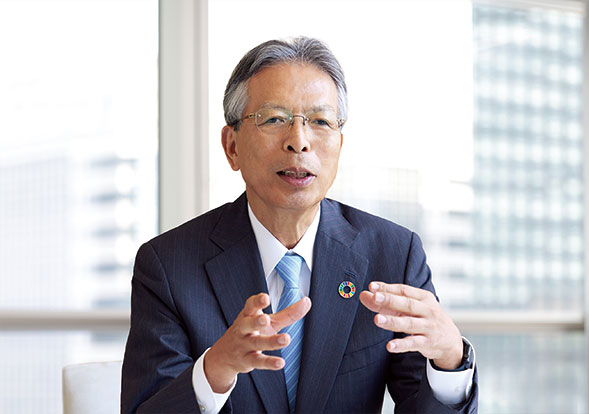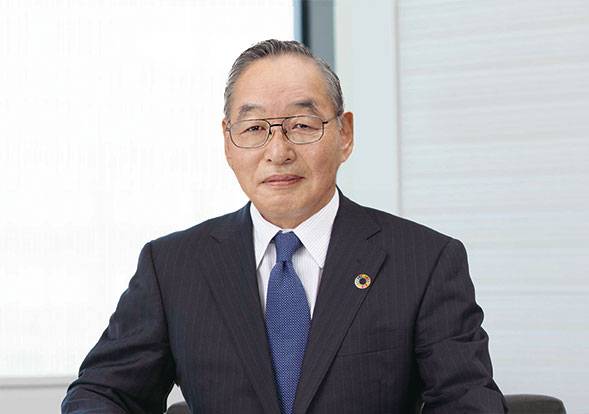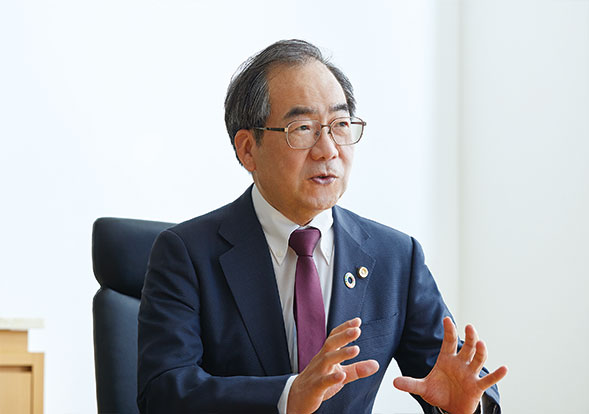
Home > Investor Relations > IR Library > Annual Report > Messages from the Chairpersons of the Compensation, Audit, and Risk Committees
Messages from the Chairpersons of the Compensation, Audit, and Risk Committees
Compensation Committee

Chair of the Compensation Committee
Outside Member of the Board of Directors
Contributing to enhancing corporate value through compensation systems
The role of the Compensation Committee is to determine the compensation policy for Members of the Board of Directors and Executive Officers and the compensation for each individual Director and Executive Officer in a manner that contributes to the achievement of Japan Post Bank’s purpose, management philosophy, mission, Medium-term Management Plan, and other objectives.
The compensation of Executive Officers is determined based on quantitative and qualitative evaluations, with due consideration given to transparency, objectivity, and fairness.
Specifically, quantitative evaluation is based on the degree of achievement of KPIs set by financial indicators and other factors, while qualitative evaluation is based on the degree of achievement of non-financial indicators that contribute to enhancing corporate value.
Japan Post Bank has introduced a performance-based compensation system for Executive Officers. Based on active discussions by the Compensation Committee, a new monetary compensation system (annual bonus) linked to short-term business performance will be introduced in fiscal 2024. In addition, ESG indicators are applied to the compensation of all Executive Officers, including President & CEO, Representative Executive Officer, and 15% of the annual bonus is evaluated based on the achievement of ESG-related KPIs.
Compensation is an important factor for Members of the Board of Directors and Executive Officers to ensure the company’s sustainable growth. Furthermore, establishing a compensation system that is reasonable and acceptable to employees is one of the most important issues for securing experienced and talented human capital. As Chair, I will continue to be aware of issues such as what kind of executive compensation system is necessary for Japan Post Bank to continue to grow, what direction compensation should take in the future, whether the current level of compensation is appropriate in light of changes in the environment, and whether compensation is appropriate for enhancing corporate value and growth. I will deepen discussions with the members of the Committee and contribute to the further development of Japan Post Bank.
Audit Committee

Chair of the Audit Committee
Outside Member of the Board of Directors
Enhance audit activities and support governance systems
To achieve the purpose of Japan Post Bank, it is important not only to ensure strict compliance but also to supervise whether business strategies for sustainable growth are being properly executed while protecting the interests of our shareholders. As part of the supervisory function of the Board of Directors, the Audit Committee not only audits compliance with rules and important management policies but also provides advice and guidance on future issues and the ideal state of the company based on the knowledge and experience of each member.
In addition, each member is also dispatched to regional headquarters, directly operated branches, and post offices in various regions in an effort to better understand the actual circumstances and issues facing branches.
In fiscal 2024, under the purpose and management philosophy of Japan Post Bank, we will contribute to the realization of our mission and Medium-term Management Plan by strengthening internal control systems, including measures to prevent internal crime and other compliance issues; risk management, including cyberattack prevention; and strengthening crisis management systems. We will also promote human capital management and initiatives to maintain and develop our business, including the retail business, such as digital service strategies, and the Σ Business. We are also focused on auditing "initiatives to realize more effective internal audits." We are working with the Risk Committee to strengthen risk management procedures and other measures, conducting efficient audits while avoiding duplication. Based on the results of visits to the front line, we are also holding discussions on how to create a more rewarding workplace.
Under these circumstances, we regret to report that there was an incident involving the inappropriate use of non-public financial information of Japan Post Bank by a contractor Japan Post. Co., Ltd. We sincerely apologize for any anxiety this might have caused our customers. We take this incident seriously and will work with other Group companies to analyze the causes and verify the effectiveness of preventive measures to ensure that such an incident never happens again.
The Audit Committee will continue to fulfill its important role in supporting Japan Post Bank’s governance system by further enhancing its audit activities with a view to achieving the purpose of the Japan Post Bank.
Risk Committee

Chair of the Risk Committee
Outside Member of the Board of Directors
We will manage risks appropriately and strive to steadily improve our earning power
The Risk Committee is a voluntary committee established under the Board of Directors alongside the three statutory committees (Nomination, Compensation, and Audit) to deliberate on important matters related to risks faced by Japan Post Bank and to report and advise the Board of Directors. Although risk is involved in all of Japan Post Bank’s operations, the Risk Committee mainly focuses on market and ALM (asset and liability management) related risks and IT system risks, which are potential major risks for Japan Post Bank, and engages with external experts.
In fiscal 2024, we examined the financial and economic situation from various perspectives, taking into account 1) the return of the domestic financial market to a "world with positive interest rates" following the Bank of Japan’s decision to end its unconventional monetary easing in March 2024, and 2) the increasing uncertainty in the global economy and financial markets since the inauguration of the 47th President of the United States, Donald Trump, in January 2025.
In terms of risk management, we have placed particular emphasis on stress tests, developing multiple scenarios for the potential materialization of future risks and verifying the appropriateness of the impact and response plans for each scenario.
In fact, after the start of fiscal 2025, the global economic and financial situation became significantly more uncertain due to the imposition of tariffs by the Trump administration. Although it is difficult to predict specific events such as the imposition of high mutual tariffs in advance, we believe that establishing severe scenario plans, such as the world economy falling into stagflation (a combination of high inflation and economic stagnation) and, sharing procedures to limit risks in advance will contribute to our ability to respond flexibly when necessary.
In addition, in the IT system area, Japan Post Bank has been strengthening its systems to defend against cyberattacks, which have become a major social issue, and to prevent damage from unauthorized money transfers. The Risk Committee has confirmed steady progress in this area.
In addition, we have deepened our discussions on the risk management system for the Σ Business. We believe that all these measures have contributed to strengthening the supervisory function of the Board of Directors through active discussions between the Risk Committee and the executive officers.
To continue to protect the important savings entrusted to us by our customers, we will continue to closely monitor the risks faced by Japan Post Bank and fulfill the responsibilities of the Risk Committee so that we can steadily improve our earning power while avoiding excessive risk-taking.